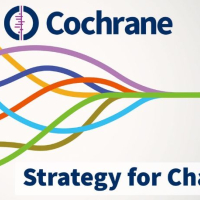
Cochrane’s Governing Board approved a new model for producing Cochrane Evidence Syntheses in March 2022. This model was designed through a process of community consultation and aims to ensure Cochrane remains viable, sustainable, and focused on major global health challenges now and into the future.
Cochrane’s organizational structure is set to be transformed over the next few years. This stepwise change programme will see us slowly moving away from the longstanding model of producing Cochrane Reviews, which relies exclusively on Cochrane Review Groups. At the heart of the new model is a structure that consists of:
Thematic Groups Up to 20 Thematic Groups will map to key global challenges. They will serve as a liaison between Cochrane and external networks, such as guideline developers, government agencies, and disease associations. They will also ensure that the existing network of enthusiastic volunteers is preserved and that the Cochrane Evidence Synthesis Units have access to the right topic expertise. Read more
Evidence Synthesis Units will be focused on delivering high-quality and timely evidence syntheses relevant to local and regional contexts, and responding to diverse stakeholder needs. Evidence Synthesis Units will be multi-topic, interdisciplinary and geographically dispersed, and will prepare evidence syntheses according to a predefined set of processes and standards. Each Evidence Synthesis Unit will be led by an experienced Cochrane evidence synthesis expert, who will have an appropriately skilled core team and will be expected to deliver a predetermined number of manuscripts to the Central Editorial Service per year. Read more
Central Editorial Service will manage the editorial process for all evidence syntheses, and provide a direct pathway for publication in the Cochrane Library. The service will be scaled up from November 2022, with the editorial process for all manuscripts, either received directly from an author team or from any Cochrane Group, being managed centrally by early 2024. Read more
Information for Authors
Cochrane is making some significant changes that will affect you as a Cochrane author. This will lead to a number of improvements in your author journey, but will also bring about some changes to the way you work with us. Please take a look at how some of the things that you need to know about the changes being made and find out where you can get information and support. Read more
Key changes
- Thematic Groups will work alongside with Evidence Synthesis Units to develop evidence synthesis to submit to a Central Editorial Service, to guarantee independence, quality assurance and integrity.
- Cochrane Review Groups will focus on prioritisation, review preparation, and knowledge translation during the transition period. They will have time over the next two to four years to consider if, when and how they will evolve as part of the new model.
- Cochrane Fields and Geographic Groups with stable funding will continue to operate throughout the transition period and will also have time during the transition period to consider how they may want to evolve as part of the new model.
- Cochrane Methods and Consumer Groups have an ongoing role in the new model.
- To complement this, Cochrane is simplifying systems, processes, and refining tools to enhance the efficiency of evidence synthesis production and provide tailored support to our authors.
https://futurecochrane.org/
